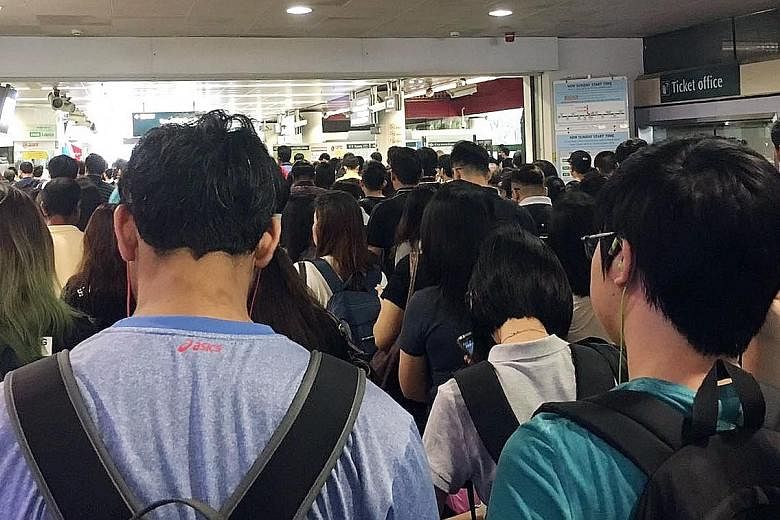Commuters affected by a spate of delays resulting from faulty track circuits on the East-West MRT Line may have to wait for at least a year before the glitches are resolved.
Half a dozen track circuit-related delays, on the Clementi-Joo Koon stretch of the line, have occurred in the past 11/2 months alone. The most serious delays were on Jan 23, Jan 19 and Jan 4, when train services were disrupted for four hours, 21/2 hours and one hour, respectively. The most recent incident was on Sunday.
SMRT said most of the incidents - which took place during peak hours - were traced to faulty track circuits, which help to keep trains at a safe distance from each other.
But the rail operator could not say why it has not been able to resolve the repeated glitches nor cite a cause other than the age of the line, which is close to 30 years old.
The Straits Times understands that there were times when technicians sent to fix a circuit fault would get a "no fault" reading on their diagnostic equipment.
SMRT suggested in its reply that the glitches - reminiscent of the signalling faults which bedevilled the Circle Line in August, September and November last year - would go away once the signalling system is upgraded next year.
"There are more than a thousand track circuits on the NSEWL (North- South and East-West Lines)... As a safety precaution, trains within the faulty track circuit would be required to be driven manually and at a slower speed. This, in turn, could cause trains behind to slow down," said a spokesman.
This causes congestion, especially during peak hours, when trains are travelling closer to one another.
"We are working on replacing all track circuits as part of a resignalling project. In addition, the new signalling system, being more advanced than the current system which was installed 30 years ago, will be more reliable as it is built with multiple redundancies."
SMRT had also said the disruptions were not related to the recently installed sleepers. The four-year project to upgrade sleepers on the North-South and East-West lines, from older timber sleepers to hardier concrete ones, was completed last month. It was supposed to bring smoother and safer rides.
Stockbroker Cole Cheong, 50, who takes the train from Boon Lay to Raffles Place, said the recent frequent delays have been frustrating.
"They only put up a sign saying trains between this station and that station will be delayed for 20 minutes. But, in reality, the delay is 45 minutes," he said. "It is very confusing because no one tells us what is the real problem."
National University of Singapore transport researcher Lee Der- Horng said "train operations are usually more complicated at the end of a line and, because of that, the number of circuits will be higher" in such a location.
Even so, he said he does not know why other extremities of lines have not experienced such a high incidence of track circuit faults.
"I am not sure if it has to do with the Tuas West extension works," he added, referring to a 7.5km extension that was supposed to open last year, but has since been delayed to the second quarter of this year.
Singapore Institute of Technology assistant professor (engineering cluster) Andrew Ng said: "While upgrading the signalling system, condition-based maintenance strategy can be implemented. Both hardware equipment in the signal equipment room and trackside equipment can be regularly inspected, repaired or replaced to reduce the risk of track circuit failures."


